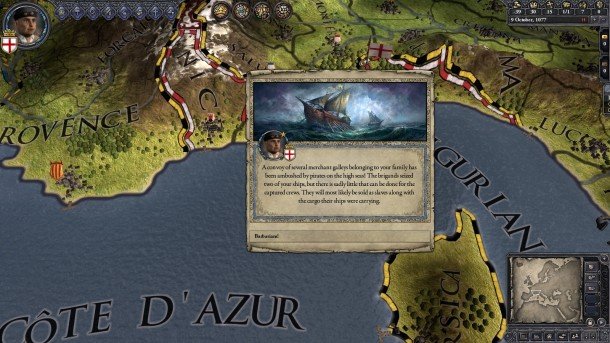
The latest expansion for Crusader Kings II is looking to launch the fleets of the medieval merchant republics, offering a very different gameplay style to the feudal lords we've lived through so far. Using trade, wealth, and political savvy, you'll have to lead your Patrician family to greatness in Venice, Genoa, Pisa, the Hanseatic League, or Gotland. We sent our spymaster to "Extract Details" from project lead Henrik Fåhraeus, which you can dig into below.
PC Gamer: What are the main differences you will notice playing as a patrician instead of a feudal leader?
Henrik Fåhraeus, Project Lead: First off, you will probably notice the graphical and interface differences; the new GUI skin, the clothes of your character and the new "Republic" button in the top bar. Then, as you explore the interface changes, you will discover your "Family Palace", which is a special Holding that you can upgrade with buildings just like a Castle or City. You can also build trade posts in all coastal provinces on the map. This is yet another new type of Holding that provides both you and the province owner with more income, and, if upgraded, with other perks. The Republican game is not a game of thrones and dynastic alliances, but of trade and gold. The great merchant republics seek to control the coasts of Europe with trade posts and cities.
Do Republics exist as their own discreet nations on the board and capture territory like the existing states?
HF: Yes, they do. In fact, they are already there, as players might have noticed. For example, Venice, Genoa and Pisa are currently republics, but they are not playable. With patch 1.09, their special mechanics become much more fleshed out, with trade posts, Patrician families, new casus bellis, etc. The new expansion - "Crusader Kings II: The Republic" - makes them playable (and adds some new graphics, such as unique clothes.)
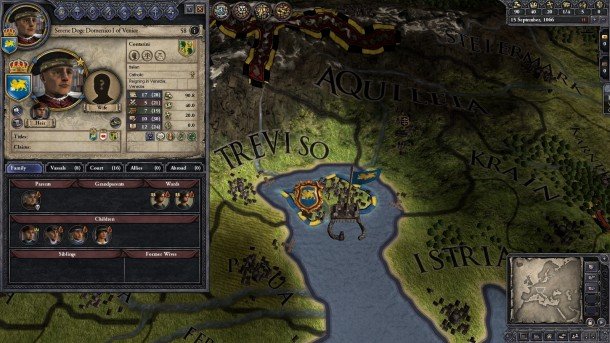
How do religion and Casus Belli operate for republics?
HF: There is no change to the religion mechanics for republics, but Patricians do have access to some additional Casus Bellis: they can seize trade posts from rivals, they can take coastal cities from anyone in order to support their trade posts, and they can take entire coastal provinces if they already have a city there. Republics are also subject to the new Embargo Casus Belli, which can be used against them by external powers in order to destroy their trade posts for an instant sum of money, representing seized assets.
The biggest gaming news, reviews and hardware deals
Keep up to date with the most important stories and the best deals, as picked by the PC Gamer team.
Can your dynasty be "elected out" of power, like the Elective succession system in the existing game? How do you go about preventing this?
HF: Yes indeed. There's no such thing as a free lunch. Doges might rule for life, but when they die there is an election where the next Doge is selected from among the five great Patrician families; the Lucchese, the Bonnanno, the Gambino... no, wait... well, you get the point. The new Doge will normally be the oldest, most prestigious family head, but players can also boost their chances by investing money in their "campaign fund" (for bribes and such.) However, losing an election is not Game Over; you just keep playing and planning how to regain control of the republic. In fact, it will be very hard to keep control of the Doge position for many consecutive terms…
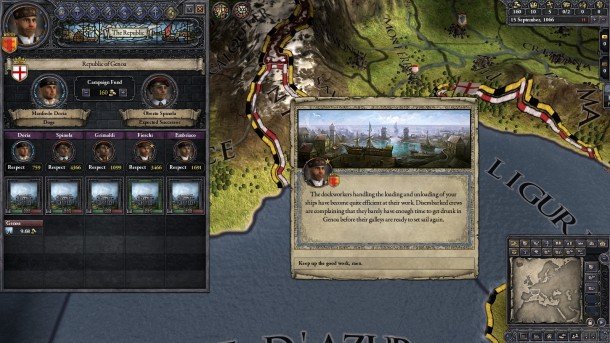
Are there any specific things Republics can do that feudal domains cannot? Anything they can't do?
HF: There are some rather major differences. Republican gameplay centers around cities and the amassing of gold rather than castles and territorial expansion. Patricians can build Trade Posts in coastal provinces, which will generate serious income for them (and give a slight boost to the local Count too.) Republics can, of course, also expand the usual way through conquest, and they can gain alliances with feudal lords through marriage. However, inheritance between the two types of realm is blocked. For example, if you marry a countess, your oldest son might become Patrician after you, but your second oldest could inherit the county from your wife, and so on.
How do republics interact with their vassals? What happens when a republic conquers a feudal territory?
HF: There is no real difference. Just like republics can be vassals of feudal lords, they in turn can be in fief to republics. However, the five Patrician families do play a very special role within republics, competing for trade and trying to get elected Doge.
Are the new trade mechanics specific to republics, or can anyone make use of them?
HF: The new trade mechanics are quite specific to republics. Only Patricians can own or build trade posts. However, feudal lords will benefit from their existence since they increase the wealth of all cities in the same province. Feudal lords (and rival republics, of course) can also choose to embargo a Republic, destroying its trade posts, for a short term money gain (and Piety, if it's an infidel Republic.)
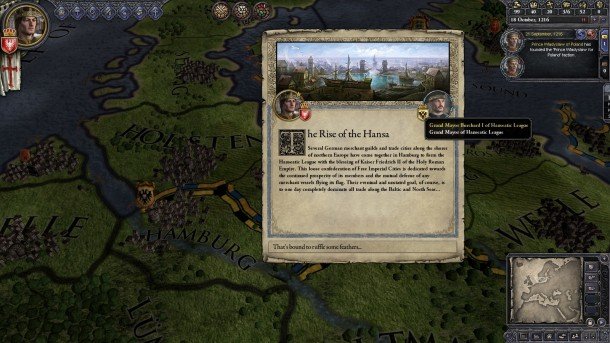
How do you handle things like the Hanseatic League existing alongside, for instance, the Kingdom of Denmark? Are they considered a vassal? How do they interact with the feudal lords in the overlapping territories?
HF: The Hanseatic League is modeled as a vassal Republic to the Holy Roman Empire. It consists of cities, some of which exist inside normal feudal counties, and at least one of which is a county capital (Lübeck, usually.) This is the way Republics tend to flourish; they take minor cities and build trade posts, only bothering with conquering entire counties when it is opportune or necessary to reduce the cost of building new trade posts. Incidentally, the Hansa, while it does not exist in 1066, can come into existence through special events.
What benefits do you get by controlling trade, and how do you defend your trade routes? Will we finally be seeing naval combat?
HF: Trade posts are a lot like regular holdings (cities, castles and temples), but they can be built in any coastal province, not just your own (though the cost increases with the distance from your territory). Only one trade post can exist per province. Bigger trade zones (areas of connected trade posts and controlled sea zones) yield more money, so you want to try to maintain chains of trade posts and to hold trade posts in a majority of the ports around a sea zone. If someone wants to take or destroy your trade posts, they normally have to win a war against you first - though Patricians within the same republic can also plot to take each other's trade posts. You can upgrade your trade posts with various buildings (again like other holdings), which can, for example, increase the maximum size of your Retinue. There is no naval combat involved; we still feel that it would not suit Crusader Kings II very well.
Is there a mechanic for starting a new republic? Can republics have "de jure" holdings and things like that?
HF: Feudal lords cannot switch over to Republican style gameplay, but they can create proper vassal Merchant Republics by granting a county and a Duchy to a vassal Mayor in a coastal province. Republics have a "de jure" title hierarchy just like everyone else, which they can use to expand in the good old fashioned way...
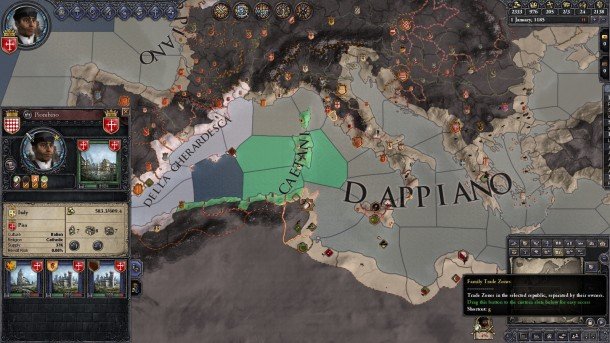
What benefits does becoming Doge give you? Does it grant you power over the other patrician families?
HF: Being Doge is a huge advantage because it gives you control over all assets in the Republic; levies and taxes. Of course, you also get to dictate top level foreign policy...
This expansion fills in one of the remaining blanks in Crusader Kings II - the great merchant republics of the era. You can now take the Most Serene Republic of Venice to greatness, or one of the other republics (though why would you, with a glorious name like that? Forza La Serenissima!) Playable and improved Republics is one of the most requested features by our players and a very natural progression for the game. Even if you do not buy the DLC, you will be able to interact with the fleshed out computer controlled Republics and their trade empires, and, since we are such nice guys, the free patch (1.09) will contain a whole slew of other neat little features (some of which people have actually even asked for.)
Thanks to Henrik and the Paradox crew for the info. The Republic is set for release in Q1 2013. Keep an eye on the Crusader Kings II official site for more.
Len Hafer is a freelancer and lifelong PC gamer with a specialty in strategy, RPGs, horror, and survival games. A chance encounter with Warcraft 2: Tides of Darkness changed her life forever. Today, her favorites include the grand strategy games from Paradox Interactive like Crusader Kings and Europa Universalis, and thought-provoking, story-rich RPGs like Persona 5 and Disco Elysium. She also loves history, hiking in the mountains of Colorado, and heavy metal music.

